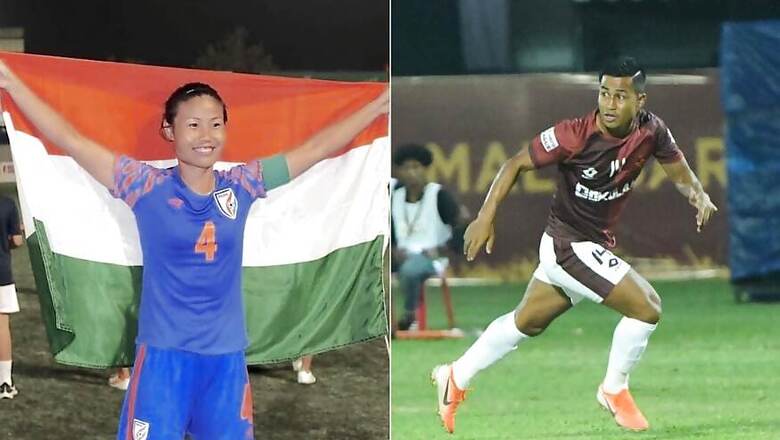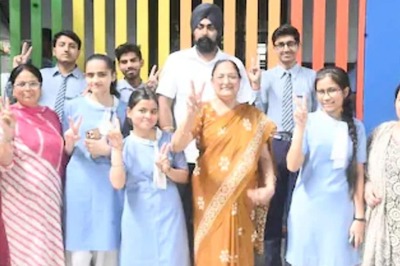
views
George Floyd's killing triggered a widespread protest against racism in the United States. Europe, through gestures in its football leagues, has lent its support to the movement. In India, celebrities and others have taken to social media to voice their dissent at racism using '#blacklivesmatter', but what about the situation closer home?
Back in March when India's ordeal with coronavirus began, there were a number of reports highlighting the racism people from the North-east were subjected to in other parts of the country; but there were very few takers for it. There were very few prominent names who chose to express their views against what fellow Indians were being subjected to.
"Sunil Chhetri had spoken about racism against North-east and Aditi Chauhan then also spoke about it. There weren't too many players who said it out loud and there need to be more voices," Indian women's national team captain Ashalata Devi said in an interaction with News18.com.
Racism is not a problem of the US, it is not even about only skin colour. As former Kerala Blasters player Darren Caldeira put it, "It is also related to your race and caste."
Indian football flourishes due to the talent that comes out of the North-eastern states. Currently, all Indian Super League (ISL) clubs have at least one player from Mizoram alone and yet the understanding of their culture and personality is lacking among general public.
WHERE DOES RACISM STEM FROM?
Gokulam Kerala FC's Malemngamba Meitei attributes racist mentality to the lack of knowledge about the people from the North-east.
"People who have friends from the North-east, they would never speak badly of them. So, racism has a lot to do with not mingling with people from the North-east or South India and not knowing about them and their culture.
"We also sing the same national anthem, we have the same language but we are still left out. Our books teach about Delhi or Bihar but there is no substantial text on North-eastern states and what people are like there," Malemnganba expressed exclusively to News18.com.
Caldeira feels racism begins as a banter or a joke among friends due to the general lack of understanding and because of the ideas with which majority of children are raised in the country.
He said the society normalises it by calling it a joke without realising "it's not a joke to everyone. We need to accept it (our faults), own up to it and change it."
Ashalata, without dwelling on the reasons, posted a hard-hitting question, "Hamari shakal se problem hai kya un logon ko (Do they have a problem with our faces)? Even though our faces are a bit different, we aren't Chinese and so I feel extremely deflated with all the racism that happens," Ashalata expressed.
She shared that there have been times when she has had to explain where her state Manipur is on the map of India. She has been asked questions like 'what is the capital of Manipur?'.
Kolkata's Pronay Halder, who currently plays for ATK in the ISL, felt that everyone who makes racist remarks should think how they would feel if they are attacked in that manner. "When Sunil (Chhetri) bhai had done live with Virat Kohli, there was a comment on it, it was disgusting. People need to start feeling it themselves."
PERSONAL EXPERIENCES
Malemnganba Meitei:
I was very young when I first stepped out of Manipur to play national tournaments. I was travelling to Goa by train, sometime around 2008 or 2009, and people just saw us and said things like 'Arre Nepali, tu hat. Hum yahan baithne aaye hain (Hey Nepali, move away. We have come to sit here)'. That was so shocking but there was little that we could do. Most of the people there also didn't react and were equally ignorant.
Then when I started playing I-League for Hindustan Aeronautics Limited (HAL), I had racist encounters in Bengaluru. I was living in a society and there were times I was referred to as 'chinki' and at that time, I didn't even understand what it meant. When I came to know the meaning of it, I was extremely frustrated and what I thought was that the next time somebody calls me that, I will hit the person.
I have my cousin brothers living in Bengaluru and when I used to go to visit them, I saw the landlords just barging in and making racist comments so casually. My cousins were still young and I was so furious that I fought with a couple of landlords. After that, my cousins told me that the landlords had stopped shouting at them and stuff like that.
We are always subjected to racism on the football field. You play in Goa or Kolkata or anywhere else in India, there will always be people shouting 'momo', 'Nepali', something that will always hurt us. They will shout from the stands. I have experienced all this in Goa also when I was playing for Salgaocar FC and they will laugh among themselves that they insulted somebody. Out of a crowd of 5,000, at least 40-50 people make racist comments, so take the number in the context of the whole population.
You have a choice today. To stop all discrimination. To eliminate hostility. To put an end to all segregation among fellow humans. To live in harmony and inclusivity. Join us in this fight against racism. We are #OneAgainstRacism. #World1AgainstRacism pic.twitter.com/z1mCrZD52E — World1 Sports (@World1Sports) June 24, 2020
Ashalata Devi:
When I got my job in Railways in Hajipur in Bihar, I joined there and I was asked to get a new bank account. So, I went to the bank inside my office but the manager there thought I was Nepali and called me Chinese. He said your face looks like Chinese which is why I referred to you like that. I replied back to him that 'do you refer to the local people as Biharis?' Then he felt bad and said 'I was only joking' and I said 'there is way of making a joke. I am here to join and if you treat me like that, I won't feel secure'.
I literally felt like, 'hamari shakal se problem hai kya un logon ko'? They look at us and behave so weirdly and make jokes. Someone calls us 'chinki' but I don't pay heed to it because I live in India and I am not Chinese. I felt like if we give attention to them, they won't stop so I started ignoring it. So whenever someone makes racist comments at me, I pretend like it doesn't bother me.
People first need to feel and understand that we are also a part of India. People need to realise North-east is also in India and we are same as the others.
IS THE FOOTBALL INDUSTRY DOING ENOUGH TO TACKLE RACISM?
Malemnganba called out for more to be done to raise awareness around racism. He felt more footballers and sportspersons from other states need to speak up for the people from the North-east.
AIFF Woman Footballer of the Year 2017 Kamala Devi said such racist attacks affect the mental health of players and more people need to speak up for them.
Jamshedpur FC Isaac Vanmalsawma believed each and every player needs to develop the spirit of being together and only then there will come a difference.
"Everyone has to come together and initiate educative programmes and dialogues. From Jeje (Lalpekhlua) to many other North-eastern players, they've all spoken about it. Jeje also spoke about the racist incident at the Marina Arena in Chennai.
"But it can't be just us individuals or people from (North-eastern) states, everybody has to come together to speak out and in support of the victims of such incidents," Isaac told News18.com.
People have been outspoken in matters related to the Black Lives Matter movement, however, not as many voices have stood up for the North-east. Caldeira feels it's a safer option to share opinions about what happens in other countries.
"You have a lot more to lose if you have something to say about the country you're living in. I understand because you never know what's going to happen with you, someone will file an FIR against you.
"I get people are just trying to play safe because it is so much easier to speak on an issue in US or Canada but then it becomes selective. It's pretty obvious that you are making all these statements regarding other countries and there's so much happening in your own country and you have no voice then," Caldeira stated.
Caldeira said the first thing that people need to get rid of is the attitude that "as long as it's not affecting me, it's all good."
"When we see an act of racism, we need to call it out because if we don't do that, we are a part of the problem."




















Comments
0 comment